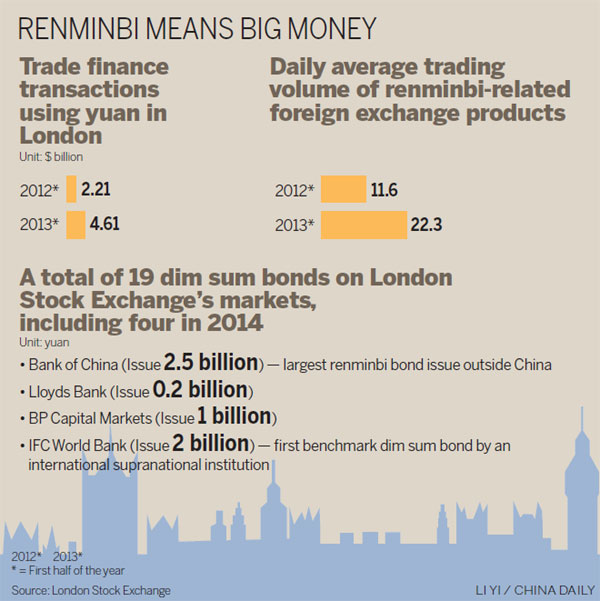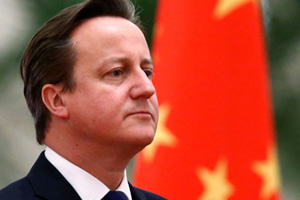Greater use of yuan benefits London
Use of the yuan in London is growing rapidly, and new milestones are looming: the appointment of a yuan clearing bank and Chinese banks being granted branch licences.
Those in turn will give a fillip to London's ambitions to become the European hub for offshore yuan activities, which it has worked toward through private-sector initiatives since 2011, competing with other European centers including Frankfurt, Luxembourg and Paris.
The new clearing bank, which would facilitate the efficient clearing of offshore yuan transactions, was expected to be appointed in June in London, says Mark Boleat, policy chairman for the City of London Corp, without knowing the date.
Some Chinese banks applied for branch status in London, and approvals were expected, a source close to the negotiations says, without being more specific about the timing. Having branch licences would give Chinese banks much greater lending and financing capacity, in turn generating more yuan activities in London.
"The branches could use capital and resources from their head offices, but subsidiaries can only use their own money to do business," the source says. "And the operating structure of branches is simpler than that of subsidiaries."
London's efforts to become a European hub for offshore yuan activities began in September 2011 when the then Chinese vice-premier Wang Qishan welcomed private-sector initiatives for the development of an offshore renminbi market in London.
Since then, banks and other commercial institutions have been rapidly developing yuan products and services, including yuan deposits, financing, foreign exchange trading and the issuance of dim sum bonds.
Trade finance transactions using the Chinese currency totalled 27.94 billion yuan ($4.61 billion) in the first half of last year, up from 13.8 billion yuan a year earlier, the City of London said. The daily average trading volume of renminbi-related foreign exchange products almost doubled, to $22.3 billion.
There are now 19 dim sum bonds on the London Stock Exchange's markets, including four issued this year, by Bank of China, Lloyds Bank, BP Capital Markets and IFC World Bank. The 2.5 billion yuan Bank of China bond is the largest yuan bond to have been issued outside China.
Pietro Poletto, head of fixed income markets at the London Stock Exchange, says demand to list yuan bonds on the exchange was growing rapidly. London's concentration of fund managers made the stock exchange a good platform to list dim sum bonds, he says.
A milestone development for London is the 80 billion yuan Renminbi Qualified Foreign Institutional Investors quota it received last year when the British chancellor, George Osborne, visited China. RQFII is a programme the Chinese government launched in 2011 that allows qualified overseas financial institutional investors to invest in China's onshore financial markets directly using the renminbi.
Investment manager Ashmore Group became the first London-based entity to gain a RQFII licence to enter China's domestic securities market in January.
Christoph Hofmann, Ashmore's global head of distribution, says the RQFII status allows international investors unprecedented access to the Chinese onshore equity and fixed income securities markets.
"The scheme allows for improved ease of repatriation of funds compared to the existing QFII scheme, and provides more flexible investment guidelines for investors looking to invest in China, which Ashmore believes will have numerous benefits to its clients," Hofmann says.
In April, China and the UK signed a memorandum of understanding to work together on a clearing bank for London. An official clearing bank facilitates efficient clearing of offshore renminbi transactions, achieved through the appointed bank's direct co-operation with the People's Bank of China, the country's central bank.
Many commercial banks now use their own yuan clearing channels. In December, Standard Chartered teamed up with Agricultural Bank of China to provide their own yuan clearing platform, making use of the two banks' expertise and customer base in the UK and China.
Michael Vrontamitis, head of product management at Standard Chartered, says the UK's yuan market is still being developed and requires support from the banking industry, and the clearing platform is an example of this support.
At the same time, Vrontamitis says, an official clearing bank in London would give the city's yuan activities a further push.
Another development that will greatly boost yuan activities in London is the granting of branch licences to London's Chinese banks, which will significantly increase their lending and financing capabilities.
Previously, Chinese banks, and many other international banks, were only allowed to set up subsidiaries, which are subject to the strict capital requirements that apply to Britain's local banks, meaning the lending and financing capacity is proportionate to the balance sheet of the subsidiary.
By contrast, branches have lending and financing capacity proportionate to their parent company's balance sheet and are thus able to give Chinese companies significantly greater lending and financing services.
John Adams, an advisory board member for the think tank Official Monetary and Financial Institutions Forum, says that in a personal capacity he believes the UK regulators regard Chinese banking regulation as very good, which would help when they assess Chinese banks' branch licence applications.
A source close to the negotiations says there had been substantial progress on the issue after earlier slow progress.
Progress has benefited both China and the UK because London is the largest foreign exchange market, the source says. "A foreign bank's branch operation would be easier for overseas business development as subsidiaries are under stricter scrutiny for investment limits and capital returns."
Vrontamitis says the potential increase in market participation by Chinese banks in London when they gained branch licences "indicates a growing recognition of the renminbi's irreversible journey of globalization" and Standard Chartered welcomes it.

(China Daily European Weekly 06/13/2014 page5)





